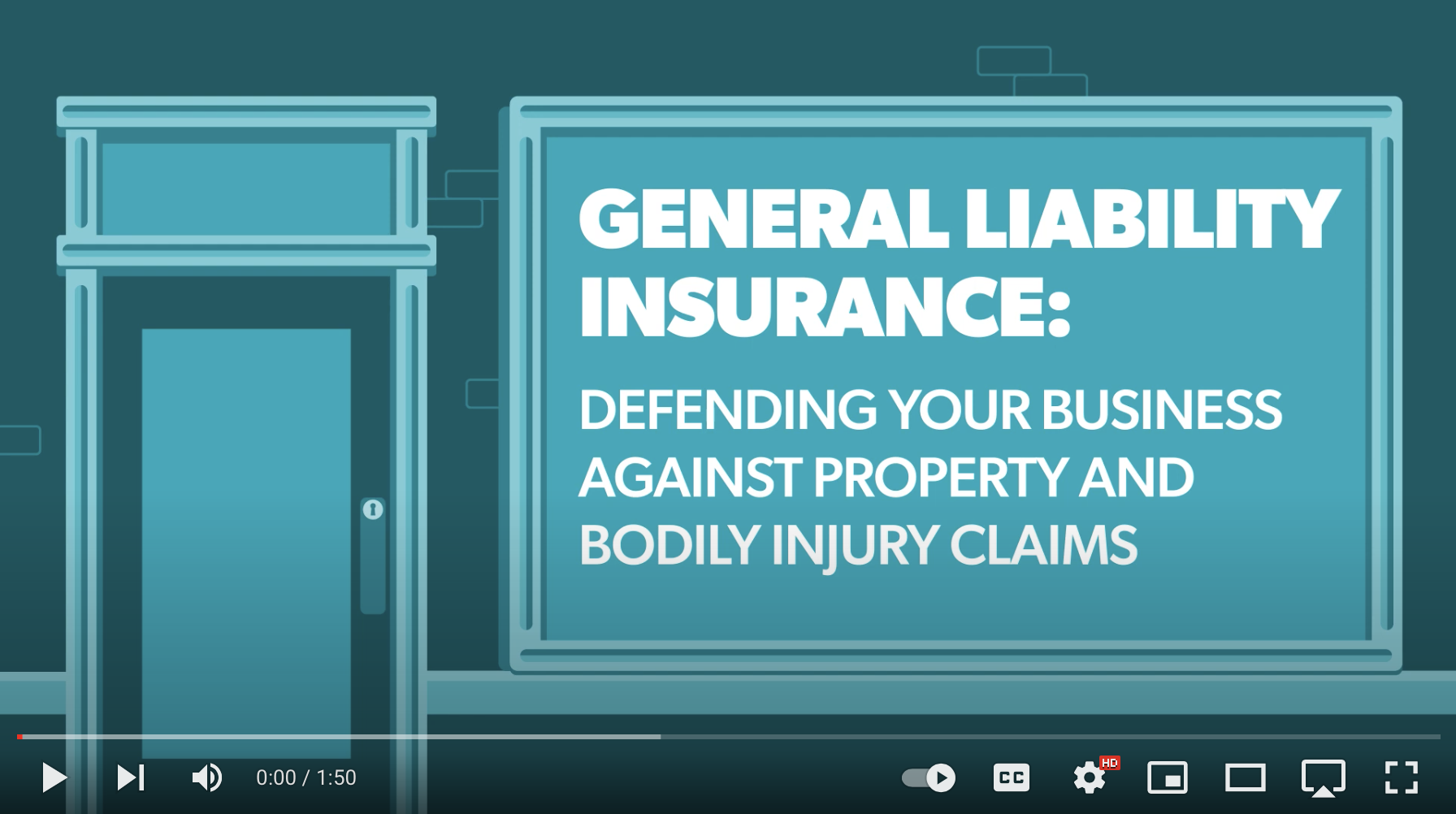What is general liability insurance for small business?
How do small businesses get prepared for the unexpected? General Liability (GL) insurance protects your or your client’s businesses from liability arising from claims of damage or injury. Often, General Liability insurance is required by landlords, financial institutions, industry regulations, or even commercial clients.
General Liability insurance protects against a variety of claims including injuries or property damage arising from business operations. If someone falls while visiting your client’s location, or if a customer is hurt by a product they sell, they can be held responsible. A GL policy covers four categories of events for which your client could be held responsible:
- Bodily injury
- Damage to others’ property
- Personal injury, including slander and libel
- False or misleading advertising
General liability explainer video
Small businesses need insurance.
Is General Liability the right coverage for you?
Find out in this overview video!

Securing small businesses with general liability insurance
Don’t think you need general liability insurance?
Almost every organization faces general liability exposures. A liability loss exposure is a condition or situation that presents the possibility of an organization becoming legally and financially responsible for injury, harm, or damage to another party.
These exposures stem from the kind of work an organization performs and where that work is executed. They also encompass other aspects of business-related circumstances, activities, or events that could result in harm to a third party.
Consider the following scenarios:
- One of your employees is carrying a box and drops it on a customer’s property, damaging the floor and wall
- Electrical work you performed was alleged to have been faulty and started a fire.
- Your company posts something in a newsletter that unintentionally harms the reputation of a competitor.
- One of your employees leaves a wet spot on the tile floor and a customer slips and falls, injuring themself severely.
- A product you sold allegedly causes bodily injury from its misuse.
All of these scenarios would be covered by General Liability insurance. This type of insurance protects your small business from claims of damage done to a third party — your customer, a bystander, or any other non-employee.
Businesses of all types and in any industry can benefit from the protections given by general liability insurance.
How does general liability insurance work?
It’s reasonable to assume that you’re not in the business of purposely harming customers or destroying their property, but accidents happen. No matter how careful you are, some things just can’t be prevented.
Unfortunately, you can still be held liable for damages and injuries sustained following the unexpected.
General Liability Insurance shifts that liability to your insurer and away from you and your business. Your GL policy pays for the costs borne by the injured party — such as repairs or medical expenses — and the defense of your business in the event of litigation.
In essence, General Liability Insurance can keep you in business in situations when you’d be otherwise forced to close and liquidate.
GL insurance is especially important for small businesses that:
- Interact face-to-face with customers and clients
- Work on or at a property owned by a third party
- Lease or own a premises
- Market via advertising or active in trade publications
- Are legally required or mandated by industry regulators to maintain sufficient general liability coverage

Small business insurance without the hassle.
Spending time answering question after question about your business just to obtain the insurance you need is simply a waste oftime. That’s why we’ve made this process both seamless and stress free. Coterie offers Professional Liability insurance policies for small businesses that can be purchased on a monthly, or annual basis.
Common questions about general liability insurance
Whether you’re a home-based business owner, run a micro small business, work as a contractor, own a startup, or fall into the many other types of small businesses, you have probably experienced first-hand the frustration of trying to find affordable coverage without having to jump through hoops. Check out these common questions that small businesses ask when it comes to General Liability insurance.
GL insurance covers claims that can come up during normal business operations. Liability claims can be expensive and, without insurance, your business could be left paying costly claims out of pocket. GL is available as a standalone policy or included in a Business Owners Policy, also known as a BOP.
You need GL insurance to protect your business. A customer who slips in your store may rack up medical expenses totaling tens of thousands of dollars — or more. Similarly, an electrical fire caused by an electrician’s shoddy installation could destroy a million-dollar home. GL insurance also makes sense for contractors to provide coverage against liability risks from working in other people’s homes.
The higher your coverage limits, the more protected you are, and the more likely you’ll stay in business after an unfortunate claim of property damage, bodily injury, or personal injury.
General Liability Insurance protects you and your business from being held financially responsible for damage caused to another person’s property, body, or reputation.
General Liability Insurance covers the cost of:
- Property damage
- Medical expenses caused by bodily injury, including death
- Reputational harm
- Legal fees
- Judgments and settlements incurred as a result of litigation
It does not protect you from:
- Damage done to your business, including your employees — for that, you would need a Business Owners Policy
Errors, omissions, mistakes, and negligence stemming from your profession — this coverage is provided by Professional Liability Insurance
The minimum amount of General Liability Insurance coverage you need varies depending on your industry, customer demands, and your comfort level.
Generally, customers and clients expect or require businesses to carry high limits in the amounts of $500,000, $1,000,000, or even $2,000,000.
Even if you’re not required to carry high coverage limits, remember: You don’t need to be a millionaire to get sued like one.
A customer who slips in your store may rack up medical expenses totaling tens of thousands of dollars — or more. Similarly, an electrical fire caused by an electrician’s shoddy installation could destroy a million-dollar home.
Do you keep that much money socked away in your bank account with the express purpose of paying for such mishaps?
Even if you do, chances are you don’t actually want to dole out that much money after you get hit by a costly judgment or settlement.
That’s where General Liability Insurance kicks in. The higher your coverage limits, the more protected you are, and the more likely you’ll stay in business after an unfortunate claim of property damage, bodily injury, or personal injury.
Your type of business determines your risk. Reach out to the Coterie Insurance Support team if you need help determining coverage.
A General Liability Insurance policy protects you from bearing the cost of damages done to another person’s property.
For example, consider a plumber who forgets to turn off the water valve before cutting through a pipe in a customer’s home. When gallons of water come surging out, it causes significant damage to the floors, baseboards, and furniture in the room.
Without General Liability Insurance, the plumber would be held responsible for the cost of cleaning, repairing, and replacing what was ruined — to the potential tune of thousands or tens of thousands of dollars.
General Liability Insurance protects your business from claims of “bodily harm, sickness, or disease, including resulting death.” Your General Liability Insurance policy would pay for the medical fees and costs incurred by the injured party, as well as the costs of your legal defense.
Depending on your policy, coverage may also include damages from mental and emotional harm.
For example, while browsing through shelves of products, a customer slips on a jar of spilled applesauce and falls, suffering a gruesome head wound. After you call 911, the customer is transported to the hospital. As a result of treatment and surgery, the customer incurs thousands or tens of thousands of dollars in medical costs.
Eventually, the customer sues you and your business for medical costs, lost income, and pain and suffering due to your negligence.
If you’re covered by General Liability Insurance, your policy would kick in to cover their medical expenses and your legal fees.
However, GL Insurance does not cover injuries sustained by you or your employees.
Damage caused during the process of manufacturing, building, installing, or completing a project or product is covered by your policy’s property damage or bodily injury limits. But what if the completed project causes damage?
Let’s say a carpenter is hired to construct a deck. After days of work, he and his team finish building the deck, leaving the homeowner free to enjoy the spring breeze and warm afternoon sun.
Unfortunately, the deck collapses due to an oversight. The homeowner falls and injures himself, while the deck itself damages the home where the deck tore away from its anchors.
In this case, the products completed coverage of the carpenter’s General Liability Insurance would pay for both the homeowner’s medical expenses and the cost of repairing the house.
When it comes to General Liability Insurance, “personal” injury differs from bodily injury in that personal injury refers to harm caused to a person’s or business’s reputation.
In simpler terms, personal injury coverage protects against claims of libel and slander and harm caused via advertising.
You may be accused of libel if a statement written by you damages another’s reputation. Similarly, slander involves speaking ill of another, culminating in harm to the reputation of another person or business.
For example, the CEO of ABC Metals schedules a meeting with a client of XYZ Mfg. in an effort to win over the client. During the meeting, ABC’s CEO tells the client that XYZ’s owner hasn’t paid taxes in 10 years, without any evidence that this claim is true. The client believes ABC’s CEO and fires XYZ.
Because ABC’s CEO lied about the integrity of XYZ’s owner, costing the latter company business, ABC’s CEO could be held liable for slander.
If the CEO falsely accused the owner of XYZ of the same thing through writing — such as a Facebook post or Google review — the CEO would be held liable for libel.
As protection against advertising injuries, personal injury coverage defends against claims of copyright infringement, advertising infringement, and invasion of privacy.
Medical payment coverage is different than coverage for medical expenses. Where other coverages under your General Liability Insurance policy require a demonstration of negligence on your behalf, medical payments coverage does not, paying out without assigning fault to either party.
The idea behind this coverage is for your policy to provide a swift and prompt payout to the injured party. As a sort of “good-faith” coverage, medical payments coverage is intended to pay for the injured person’s most immediate medical expenses, ideally reducing the likelihood they pursue litigation.
Think of a carpenter who installed a fixture but failed to properly secure it. Later on, the fixture falls onto the homeowner and breaks her arm. The carpenter’s medical payments coverage would kick in to ensure the homeowner receives a swift payout that covers her immediate medical expenses — resetting her broken bones, the cast, and the cost of her prescribed painkillers, for instance.
In turn, the homeowner has less reason to sue the carpenter. She could still pursue a lawsuit against him — which would be covered by his bodily injury coverage — but because her immediate medical costs were taken care of, she may decide to let it go (though she probably won’t be sending him referrals any time soon).
The cost varies depending on your industry and coverage needs. Coterie Insurance offers affordable options for all types of small businesses!
Yes, you definitely need coverage if you have an LLC. That way, if a claim arises, your small business insurance policy will cover it instead of your own bank account.
Yes. General Liability for small businesses is the same as Commercial General Liability.

